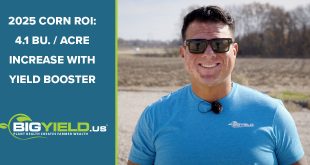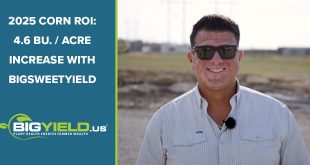
Landon Teal discusses timing and benefits of BigSweetYield applications.
Listen to the BigYield.us team and Kyle Hill, Ag 1280 Farm Director, each Monday, Wednesday, and Friday on Ag 1280 KDKD-AM. The segments air at 7:15 am and again at 12:15 pm.
This segment originally aired on July 21, 2017.
Audio Transcript
Kyle: Time for a BigYield Spotlight. I’m Kyle Hill, visiting with Landon Teal of BigYield.us. Landon, good to have you in the studio.
Landon: Thank you Kyle.
Kyle: Let’s talk about crop stages. Where would you say in this part of the year we are in the crop cycle?
Landon: For corn, depending on when the fields got planted, most of them are starting to pollinate and some are already past that and have started to kernel fill. For soybeans, most are in the V5 to V8 range, although some of the earlier planted soybeans are already in the flowering process.
Kyle: Now that is an important time int he soybean life cycle. Why is that?
Landon: There are a couple reasons that this is a very important time. The most obvious answer is that is the first step in developing pods and hitting the reproductive stages. As we all know, that is the money maker for the crop. The second reason would be this is a great time to make all your fungicide applications, as this is a direct route into the plant. Soybeans, being a naturally sensitive plant, will absorb a better rate of product at this time. This is also the time we recommend our growers apply our BigSweetYield.
Kyle: BigSweetYield being one of your major products, how does it help soybeans?
Landon: BigSweetYield is a cold-processed sweetener that has really shown great results for plant health and plant growth. There are many benefits to using this product. A couple of those are increased plant Brix levels, and insect pressure reduction. Using a rate of 1 pound per acre, this product is very reasonable for increasing plant health and yield.
Kyle: What has been the ROI / yield improvement from a treatment of BigSweetYield?
Landon: One thing that BigSweetYield has really been good for especially in this day and age, is it’s very environmentally friendly. When we apply this stuff it’s not going to hurt the environment, as far as wildlife and other plants. It also has a low cost per acre. We like to see that ROI, and in years past we have seen a four bushel gain on soybeans. We can apply this product and not only are we improving plant health, but as the plant health thrives we can see an increase in yield.
Kyle: That was just one treatment that gave the four bushel increase?
Landon: Yes, one treatment. We usually like to hit that on the reproductive stages like we have stated before. Hit it when the plant is starting to flower or after it has flowered and those beans can really put on more yield.
Kyle: Impressive. Can you mix this product with fungicides or insecticides?
Landon: Absolutely. Here at BigYield we almost always tank mix our products every time we go into the field to spray. Whether it is a herbicide, insecticide, or fungicide, this product does mix very well. One thing that we do recommend is mixing it with water first, because it comes in a powder form, then adding your products after it is mixed with water.
Kyle: If anybody has questions about your BigSweetYield or any of your other products, who should they contact?
Landon: They can contact us online at www.bigyield.us or give us a call at 816-773-6096, or they can stop by the research farm in Garden City.
Kyle: And the research farm right there off of route 7 west of Garden City. Of course, you’re putting that BigSweetYield to use quite a bit to keep those soybeans looking great.
Landon: Absolutely.
Kyle: Landon, we thank you very much for your perspective and we look forward to more conversations with you soon.
Landon: Thank you Kyle.
 BigYield High Yield Soybeans, High Yield Corn, and High Yield Wheat
BigYield High Yield Soybeans, High Yield Corn, and High Yield Wheat



